First Racehorse Publishing edition 2016
All rights to any and all materials in copyright owned by the publisher are strictly reserved by the publisher.
The material contained in this work is derived from government documents. Nevertheless, Racehorse Publishing, claims copyright in all additional content, including, but not limited to, compilation copyright and the copyright in and to any additional elements, design, or layout of whatever kind included herein. All inquiries should be addressed to Skyhorse Publishing, 307 West 36th Street, 11th Floor, New York, NY 10018.
Racehorse Publishing books may be purchased in bulk at special discounts for sales promotion, corporate gifts, fund-raising, or educational purposes. Special editions can also be created to specifications. For details, contact the Special Sales Department, Skyhorse Publishing, 307 West 36th Street, 11th Floor, New York, NY 10018 or .
Racehorse Publishing is a pending trademark of
Skyhorse Publishing, Inc., a Delaware corporation.
Visit our website at www.skyhorsepublishing.com.
10 9 8 7 6 5 4 3 2 1
Print ISBN: 978-1-63158-137-3
Ebook ISBN: 978-1-63158-138-0
Printed in the United States of America
T ABLE OF C ONTENTS

F OREWORD

D R . L OUIS F ISHER
In these eighty-five essays, Alexander Hamilton, John Jay, and James Madison analyze the structure of government best designed to protect individual rights and safeguard constitutional government. The essays were published in New York newspapers during 1787 and 1788 to defend the Constitution and persuade a sufficient number of states to ratify it. Each essay was signed Publius. It took scholars many years to decide who wrote which essay. There was broad agreement among the Framers on the need to create a system dedicated to self-government and to break with monarchical models.
After America declared its independence from Great Britain, it adopted the Articles of Confederation to provide national guidance to the various states. The Articles were ratified and put in force on March 1, 1781. Article II of the Articles proclaimed: Each state retains its sovereignty, freedom and independence, and every Power, Jurisdiction and right, which is not by this confederation expressly delegated to the United States, in Congress assembled. All national authoritylegislative, executive, and judicialwas carried out by the Continental Congress.
The surrender of Cornwallis at Yorktown on October 19, 1781, brought an end to the British effort to defeat the American colonies. A treaty of peace with Great Britain was signed on September 3, 1783. Various efforts were made to remedy defects in the Articles of Confederation, including a meeting of delegates at Annapolis, Maryland, on September 14, 1786. Failure to reach agreement led to a decision to meet in Philadelphia to debate a new national government. The focus shifted from revising the Articles of Confederation to creating a new national government.
Different plans were presented at Philadelphia, including the Virginia (or Randolph) plan, the New Jersey (or Patterson) plan, and Hamiltons plan of union. Debates on the new Constitution began on May 25, 1787, and continued until September 17, 1787, when the convention adjourned after agreeing to a Constitution with stronger national power. As opponents to the Constitution (Anti-Federalists) would later argue, delegates to the Philadelphia Convention were authorized to revise the Articles of Confederation, not to make fundamental changes in the relationship between the national government and the states.
Readers today may wonder about the value of seeking guidance from men who wrote in the 1780s. How could their understanding of the eighteenth century apply to conditions of contemporary times? The answer is that the Framers studied human nature over the course of the previous two thousand years to guide them in writing a Constitution. They studied such factors as ambition, avarice, personal animosity, and party opposition. Has human nature changed or do we see recurrent themes that instruct us today?
Consider Federalist No. 4 by John Jay. In analyzing the causes of war, he wrote: It is too true, however disgraceful it may be to human nature, that nations in general will make war whenever they have a prospect of getting any thing by it; nay, absolute monarchs will often make war when their nations are to get nothing by it, but for purposes and objects merely personal, such as a thirst for military glory, revenge for personal affronts, ambition, or private compacts to aggrandize or support their particular families or partisans. Single executives engaged in wars not sanctified by justice or the voice and interest of his people. Because of that record, the Framers vested in Congress the sole power to take the nation from a state of peace to a state of war.
From 1789 to 1950, presidents who wanted to use military force against another nation came to Congress either for a formal declaration of war or specific statutory authorization. The record of presidents from 1950 has been radically different. Military initiatives by Truman (North Korea), Clinton (Haiti, Bosnia, and Kosovo), and Obama (Libya) did not receive congressional authorization. Instead, they sought authority from the UN Security Council and NATO allies. Through this circumvention, presidents have undermined the principles established by the Framers and weakened the system of self-government.
In relying on the Federalist Papers, it is important to read the essays in full and not pick and choose particular passages that produce distortions. For example, in the 2015 decision of Zivotofsky v. Kerry, the Supreme Court for the first time upheld an exclusive power of the president to recognize foreign governments. In doing so, it struck down statutory policy adopted by Congress in 2002. As Chief Justice Roberts noted in his dissent: Todays decision is a first: Never before has this Court accepted a Presidents direct defiance of an Act of Congress in the field of foreign affairs.
The Court justified its decision in part by relying on Hamiltons Federalist No. 70, which says it would not be disputed that unity is conducive to energy. With unity comes the ability to exercise decision, activity, secrecy, and dispatch. The Court assumed that those four qualities are inherently positive in nature, meriting support for unilateral presidential power in foreign affairs. It failed to understand how those qualities can damage the country and constitutional government. Consider these presidential initiatives: Truman ordering US troops in Korea to go northward, prompting Chinese forces to intervene and produce a costly stalemate; Johnson escalating the war in Vietnam; Reagans involvement with Iran-Contra; Bush II using military force against Iraq on the basis of six claims that Saddam Hussein possessed weapons of mass destruction, with all claims found to be empty; and Obama ordering military action against Libya.
In relying on Federalist No. 70, the Court ignored Hamiltons warning in Federalist No. 75 about unchecked presidential power. He noted that several writers had placed the power to make treaties in the class of executive authorities, but to Hamilton it will be found to partake more of the legislative than of the executive character, though it does not seem strictly to fall within the definition of either of them. Speaking more broadly about the realm of foreign affairs, he cautioned: The history of human conduct does not warrant that exalted opinion of human virtue which would make it wise in a nation to commit interests of so delicate and momentous a kind, as those which concern its intercourse with the rest of the world, to the sole disposal of a magistrate created and circumstanced as would be a President of the United States.

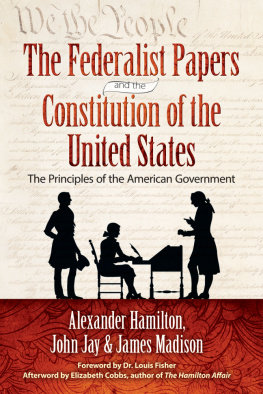
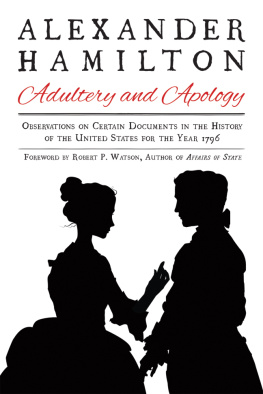


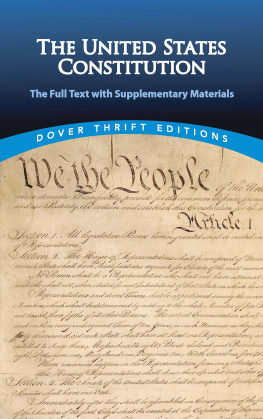
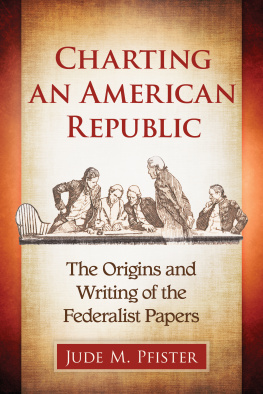
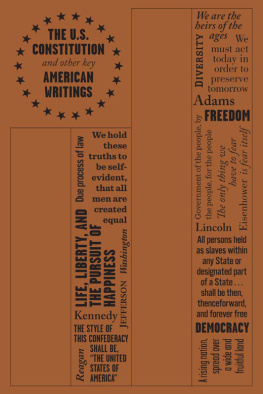
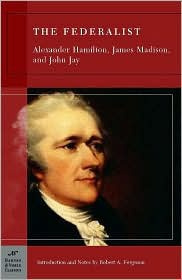
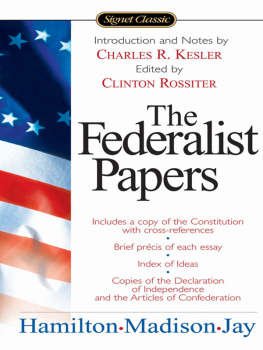
![Jay John - The Federalist : a collection of essays, written in favour of the new Constitution, as agreed upon by the Federal Convention, September 17, 1787. : In two volumes. Vol. I[-II.]](/uploads/posts/book/76130/thumbs/jay-john-the-federalist-a-collection-of-essays.jpg)



